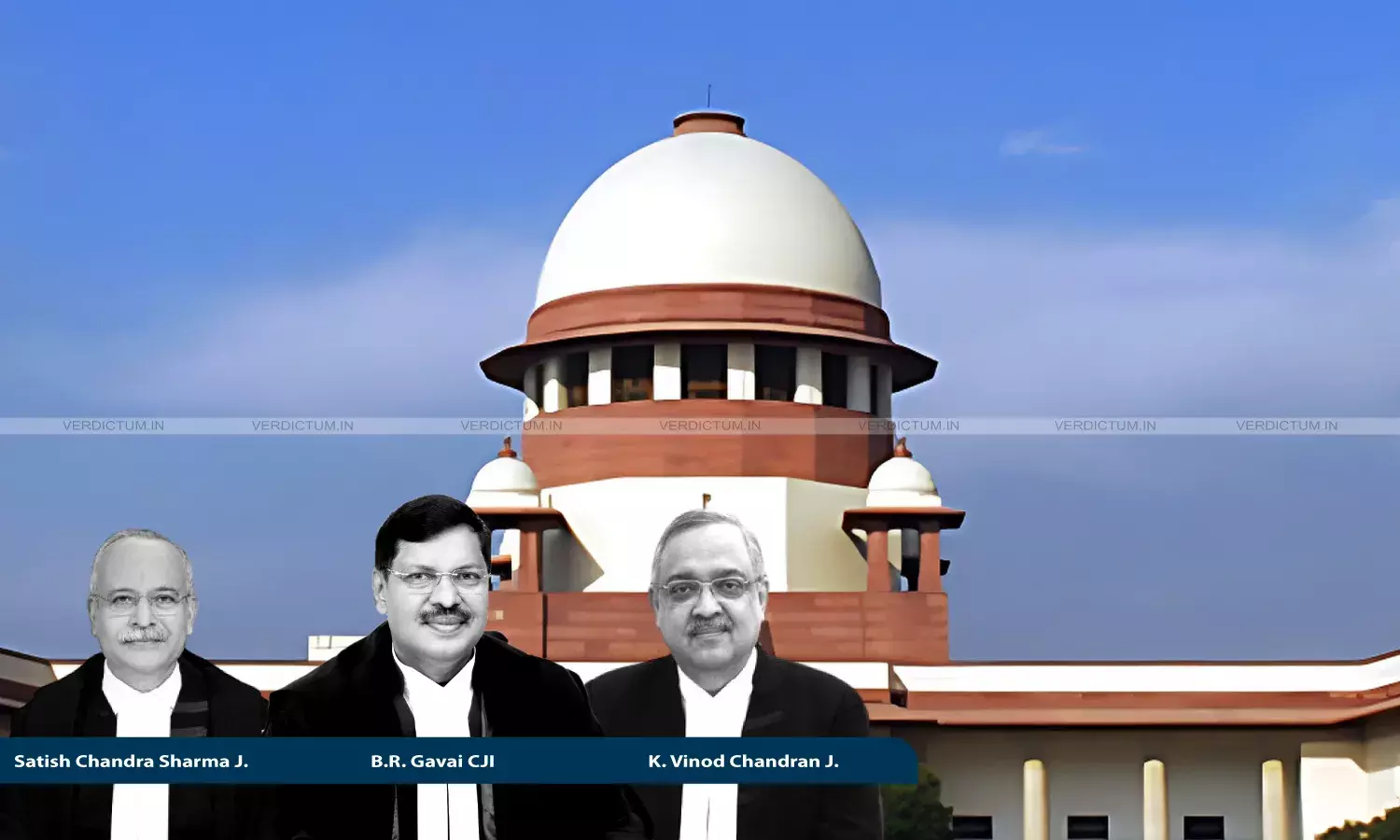Pre-Independence Documents Have Greater Probative Value In Caste Claims: Supreme Court Asks Scrutiny Committee To Issue Caste Validity Certificate
The Appeal before the Supreme Court was filed against the judgment of the Bombay High Court upholding the order invalidating the Caste Certificate of the appellant and his father.

Chief Justice Of India B.R. Gavai, Justice Satish Chandra Sharma, Justice K. Vinod Chandran, Supreme Court
While directing the Scheduled Tribe Certificate Scrutiny Committee to issue a Caste Validity Certificate to a medical aspirant , the Supreme Court has reiterated that pre-Independence documents will have a greater probative value while considering the claim of the applicant.
The Appeal before the Apex Court was filed against the judgment of the Bombay High Court dismissing the petition challenging the order of the Scheduled Tribe Certificate Scrutiny Committee confiscating and invalidating the Caste Certificate of the appellant and his father for the Scheduled Tribe – Koli Mahadev.
The 3-Judge Bench of Chief Justice Of India B.R.Gavai, Justice Satish Chandra Sharma and Justice K. Vinod Chandran said, “Apart from that, the view taken in Anand (supra) that pre-Independence documents will have a greater probative value while considering the claim of the applicant has been followed by this Court as well as various High Courts in catena of decisions.”
Senior Advocate Uday Bhaskar Dubey represented the Appellant while Advocate Varad Kilor represented the Respondent.
Factual Background
In the year 1943, the appellant’s grandfather was admitted to Zilla Parishad Primary School, wherein his caste was mentioned as Koli Mahad. His uncles, too, were admitted under the same caste. In the year 2005, the appellant was admitted to the Primary School, wherein his caste was also mentioned as Koli Mahadev. In the year 2010, the State of Maharashtra issued a circular announcing the implementation of certain schemes in villages/colonies having a Scheduled Caste and Scheduled Tribe population exceeding 40% and the appellant’s village was included in the list of eligible villages under the said circular.
In 2019, the appellant appeared for the National Eligibility-cum-Entrance Test (NEET) UG examination and became eligible for admission in a Medical College on the strength of his Caste Certificate. However, the Caste Certificate of the appellant had not been validated till then. The appellant, therefore, filed a writ petition before the High Court seeking direction for scrutinizing his Caste Certificate at the earliest. During the pendency of the writ petition, the Scrutiny Committee cancelled the Scheduled Tribe Certificates of the appellant and his father. The Petition challenging such action was dismissed. Being aggrieved thereby, a special leave petition was filed by the appellant.
Reasoning
Referring to the school entry made in the name of the grandfather and detailing his caste, the Bench noted that the words Koli Mahadev written in the entry were in the same ink and in the same handwriting. “Therefore, we find that there could be no scope for interpolation in the said entry. It is further to be noted that on the basis of this pre Independence entry, the school records of the appellant’s father, Madhav Jalba Makalwad and his uncle, Vyankat Jalba Makalwad also show the caste as Koli Mahadev”, it said.
Coming to the aspect of affinity test, the Bench referred to the judgment in Anand v. Committee for Scrutiny & Verification of Tribe Claims and Others (2012) wherein it has been observed that with the change in times, migration and modernization, the joining of people from the tribal population in the mainstream of the society, the fact that they are not in a position to recollect the anthropological and ethnological traits, deity, rituals, customs, mode of marriage, death ceremonies, method of burial of dead bodies, etc., of their tribe cannot be solely a ground ipso facto to deny the said claim.
It was also held in Anand (Supra) that while dealing with documentary evidence, greater reliance may be placed on pre-Independence documents because they furnish a higher degree of probative value to the declaration of status of a caste, as compared to post Independence documents. Insofar as the applicability of the affinity test is concerned, the Court observed that a cautious approach has to be adopted. It was also observed therein that the affinity test may not be regarded as a litmus test for establishing the link of the applicant with a Scheduled Tribe.
The Bench thus held that the Scrutiny Committee's invalidation of the appellant’s caste claim was not sustainable in law. Allowing the appeal, the Bench mentioned, “It is held that the appellant belongs to the Koli Mahadev Tribe. The Scrutiny Committee is directed to issue Caste Validity Certificate to the appellant within a period of six weeks from the date of this judgment.”
Cause Title: Yogesh Madhav Makalwad v. The State of Maharashtra (Neutral Citation: 2025 INSC 964)
Appearance
Appellant: Senior Advocate Uday Bhaskar Dubey, AOR Kailas More, Advocates Nirmala D. Borade, Nikita Singh, Meena Sehrawat, Akash Yadav, Kaustubh Dube
Respondent: Advocates Varad Kilor, Siddharth Dharmadhikari, AOR Aaditya Aniruddha Pande, Advocate Shrirang B. Varma

